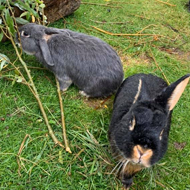
RWAF says rescues are 'overrun with abandoned rabbits'.
Rabbit rescues are being 'overrun with abandoned rabbits' after the increase in rabbit sales during the UK's COVID-19 lockdowns, says rabbit welfare charity, The Rabbit Welfare Association and Fund (RWAF).
The Rabbit Residence Rescue, a rabbit rescue centre based in Hertfordshire, looked at three trading sites, and identified 66 new rabbit breeders since the first lockdown in March 2020 to October 2021.
In comparison to the 27 new traders identified between March 2018 to October 2019, this shows an increase of 244 per cent in new rabbit breeders since the lockdown began.
As demand for new pets went up over lockdown, more breeders took advantage of this. However, with much misinformation and misunderstanding over the complexity and cost of caring for rabbits, many rabbits have been abandoned, with The Bristol Rabbit Rescue seeing an increase of 262 per cent of unwanted pet rabbits in October 2021, compared to the previous year.
Of the 66 new breeders identified by The Rabbit Residence Rescue, the majority of these were offering lops and mini lops, breeds which are more prone to narrowed ear canals, excess wax build up, ear pain, misaligned and overgrown incisors, molar overgrowth and molar spurs, as the RVC discovered in a study on lop-eared rabbits.
Lea Facey, from Rabbit Residence Rescue, commented on the shocking figures: “This data is just a drop in the ocean. If the same pattern was replicated across all pet trading platforms and more breeds, we could be looking at a massive and still unregulated market.
“These figures are very worrying and will only get worse as people look for alternative ways to make the money to pay their bills, particularly at a time when household bills are escalating.”
Co-founder of Little Furries Rabbit Rescue, Cinzia Delegate, said: “The number of stray and dumped rabbits is the worst we have ever experienced. It is out of control and unmanageable.
“Sadly, we feel the recent pet sales have contributed to the spiralling effect of the situation, creating an influx of unwanted rabbits being discarded on the streets or through any means possible through social media and sales channels.
“Action to stop breeding and stop sales must be considered as a matter of the utmost urgency.”
Urging potential rabbit owners to adopt from a rescue instead of buy from a breeder, Rae Walters, director of the RWAF, said: “There is a misconception that rescue rabbits are ‘damaged goods’, and so new owners prefer to get new rabbits from shops and breeders, but this simply isn’t true.
“Rescue rabbits are not damaged, most have been simply abandoned and are in need of a loving home.
“The issue is the constant supply on demand for ‘new rabbits’, so rabbit breeders will continue to breed rabbits like it’s going out of fashion, intensifying the problem just to line their pockets with zero concern for animal welfare.”



 The Veterinary Medicines Directorate (VMD) is inviting applications from veterinary students to attend a one-week extramural studies (EMS) placement in July 2026.
The Veterinary Medicines Directorate (VMD) is inviting applications from veterinary students to attend a one-week extramural studies (EMS) placement in July 2026.